| Friday, June 3, 2005 |  |
|
|
|
 The newspapers one gets by the metro here had a big fullpage ad yesterday about Transatlantys. Essentially the announcement of the grand project of building a transatlantic tunnel, from France to America. Paris to New York in train in 8 hours. Work starts this month. And you can win tickets. Sounds great. The newspapers one gets by the metro here had a big fullpage ad yesterday about Transatlantys. Essentially the announcement of the grand project of building a transatlantic tunnel, from France to America. Paris to New York in train in 8 hours. Work starts this month. And you can win tickets. Sounds great.
Except for that it doesn't exist. It is some kind of hoax, or a game, or a gimmick to promote something. It isn't quite clear what. The elaborate website doesn't give a hint. Best guess seems to be that it is a viral marketing campaign run by SNCF, the company that runs the French train system, as they seem to be the owners of the domain.
[ News | 2005-06-03 02:26 | | PermaLink ] More >
|
|
| Friday, May 6, 2005 |  |
|
|
|
The U.S. FCC (Federal Communications Commission) had decreed that from July 1st all equipment in any way connected with over-the-air TV broadcasts would have to be manufactured with a so-called Broadcast Flag. Which essentially means you couldn't do anything with the received program other than what its "owner" wanted you to do. I.e. you wouldn't be able to copy it, put it on a DVD, watch it on your computer, take a screenshot, or anything else that might be convenient and meaningful to you. All your equipment would be crippled, solely in the interest of protecting the broadcasters' business model. Or, rather, the way things worked a couple of decades ago. The movie, recording and broadcasting industry can unfortunately easily find corrupt politicians and public officials who will try to do their bidding.
But, luckily, this time it seems it didn't work. Today a U.S. Court of Appeals has ruled that the FCC has absolutely no authority to regulate what people do with their electronic devices at home, other than when it comes to the actual transmission through radio waves.
Somebody in the U.S. Congress might well decide to make such a scheme law anyway. But until then it seems that the plan is dead. Lots of other schemes are still in action, that try to limit the natural movement of information, and put all the controls in the hands of a few large companies, but at least this seems like good news.
[ News | 2005-05-06 21:09 | 0 comments | PermaLink ]
|
|
|
|
OK, this is in French. An evening for blogging professionals in Toulouse, Rencontres Blog Pro. I didn't even realize there were so many big bloggers here, and this is the first event of that kind I'll go to here. My pal Lionel and I will be there, of course. And Loic le Meur will be there, whom I've met in London. Otherwise I don't seem to know anybody.
[ News | 2005-05-06 20:14 | 0 comments | PermaLink ]
|
|
|
|
Reboot 7, June 10-11 in Copenhagen. I'll have to be there, of course. A conference for techie visionaries, and there will be some big ones there. Doc Searls, David Weinberger, Cory Doctorow, Robert Scoble - that kind of people. reboot is the european meetup for the practical visionaries who are building tomorrow one little step at a time, using new models for creation and organization—in a world where the only entry barrier is passion. reboot is two days in june filled with inspiration, perspective, good conversations and interesting people.
[ News | 2005-05-06 20:06 | 0 comments | PermaLink ]
|
|
| Tuesday, March 29, 2005 |  |
|
|
|
 Remember Giuliana Sgrena, the Italian journalist who was freed in Iraq, and shot at by U.S. forces, and her rescuer, an Italian intelligence agent, killed? There's an interview with her where she sets the record a bit more straight. Transcript, audio, video. It indicates quite clearly that the official U.S. government version of events is a fabrication. The official story was that their car was driving on one of the most dangerous roads in Baghdad, and didn't stop when asked to at a checkpoint, and the soldiers were afraid for their safety, so they shot in self-defense. Remember Giuliana Sgrena, the Italian journalist who was freed in Iraq, and shot at by U.S. forces, and her rescuer, an Italian intelligence agent, killed? There's an interview with her where she sets the record a bit more straight. Transcript, audio, video. It indicates quite clearly that the official U.S. government version of events is a fabrication. The official story was that their car was driving on one of the most dangerous roads in Baghdad, and didn't stop when asked to at a checkpoint, and the soldiers were afraid for their safety, so they shot in self-defense.
They weren't on that road at all. They were driving on a secure VIP road, going directly from the secured Green Zone to the Baghdad airport. A road only used by military and embassy personnel.
There was no checkpoint. There was a tank standing off the side of the road, which didn't signal in any way for them to stop.
The tank shot at them from behind, without warning, with a high caliber gun. A four inch bullet penetrated her lungs and her shoulder.
Oh, it could of course still have been an accident, a mistake, a misunderstanding. Maybe the Italians forgot to notify the Americans that they were going to take that road, and maybe they were supposed to, I don't know. But the cover story is false. And, quite obviously, we're only even hearing about this because this is a high profile, very well covered story, involving government officials and journalists. If it had just been some ordinary Iraqies who were in the wrong place at the wrong time, they would just have been bitterly buried by their families, and at best, if somebody bothered to count them, they would have been part of some statistic. You know, like 100,000 dead Iraqies, who all happened to be in the wrong place at the wrong time.
[ News | 2005-03-29 20:34 | 0 comments | PermaLink ]
|
|
| Sunday, March 27, 2005 |  |
|
|
|
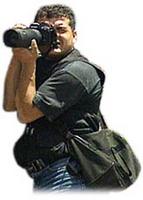 As to where the news is.. As to where the news is..
What would be good news sources for a networked society that has different priorities than the old fashioned media?
An oldfashioned newspaper or TV station would have a line in with the frontline for various kinds of news. There'll be somebody listening to the police radio channels. There'll be somebody at the government capitol, or the local town hall, trying to keep up with the issues that pass through. Somebody watches and analyzes the stock market. Somebody will be monitoring the major cases in the court house. There will be a helicopter that can go where some action is reported and get video from the air. There will be reporters sent out to war zones, catastrophe areas, and that kind of thing. Plus if that particular news organization doesn't have the resources itself, it will get wires from bigger news organizations that do it.
But even with all of that, journalists are busy, and they often need to have a story today or tomorrow. So very often they're merely passing on what somebody else said or wrote. Their story might simply be the summary of some report somebody did. It might be a rewrite of somebody's press release. The key points of somebody's book. An interview with somebody who seems to know what is going on. Probably only rarely is there time or interest in actually getting to the bottom of what is going on, or double-checking everything. So the mosaic of a certain general image is being presented, even though it might not really be the truth, or the most important things to know. Just because everybody's flocking to roughly the same sources.
So, say you were a blogger, who wanted to write about interesting things going on, and you wanted more primary sources, to maybe discover a different picture than what you were fed, where would you go? Do you know the difference between primary sources and secondary and tertiary?
Let's say there is something going on somewhere. A tsunami, a war. You'd want to hear from the local people who're there. The locals, the people on the ground, the people who're plugged into the action. And, indeed, if people like that have blogs, that's some of the most interesting stuff. Salam Pax, an Iraqi inside Iraq before the invasion. Kevin Sites, photo journalist in Iraq.
Back when NATO was bombing Yugoslavia it made a big impression on me that I could chat online with a friend in Beograd, in-between the bombing raids and power failures. You usually get a very different story than what appears in the normal media.
But how do you find these people when you're looking? Maybe there will just be enough bloggers that you'll always be able to get the real story from the ground, I don't know. Or maybe others will find such stories interesting enough that they'll be passed on to you somehow. But it might be nice with a more organized way of finding a local voice in some particular area.
A problem with a lot of news is that it is a little haphazard what you'll hear, and you might not get any follow-up at all. Like, somebody might write an article about some promising new discovery or invention. And very often, that's all you'll ever hear about it. Nobody wrote an article as a follow-up, a year later, telling you what actually happened. Somebody invented super-cheap solar cells, discovered the ruins of Atlantis, or whatever. Sounds very interesting. And then you never hear about it again. I want to hear what didn't work out about it. They were mistaken, they didn't get funding - what happened? And the trouble is that that's very hard to find out if nobody wrote an article about it. Or unless I had a lot of time on my hand to research it and call people and try to find out. I certainly couldn't do that with everything I might be interested in. But a network of people could, if there were an organized way of remembering open issues.
Statistical data can be a source of news, if you have enough of it. You could find out what is better, what is worse, which trends seem to be related to each other, etc. That is, if you had access to the data in a fairly consistent and timely manner. It shouldn't be hard for you to check for yourself how it is going with global warming, whether the economy is better or worse, how different parts of the world are doing. But it is, for some reason. I don't know anybody doing that. We seem content just reading an article about some several year old statistical report, telling us what it means. I'm sure there are all sorts of issues involved in gathering and normalizing data, but it really shouldn't be unthinkable that I could look for myself. Maybe I can and I just haven't plugged into the right places. I mean, people who're into stock markets will watch all sorts of stats continually. Consumer price indexes, unemployment rates, from month to month. They just don't seem to produce the kind of data I'd find interesting.
There are all sorts of people who're at the forefront of something interesting happening. Scientists, explorers, activists, aid workers, government officials. Should I hope for that they'll all have blogs and that they'll give us the straight dope about what is going on? Maybe. Blogging gives a lot of reasons to hope for hearing the truth more often. But, still, a lot of people who do important things are too busy to chat about it. Or they're in organizations that don't believe in sharing it freely. Or they're in a system where what they're doing will have to be peer reviewed and published before it is mentioned publically.
Really, I'm just looking for what channels I should be listening on, to get what's really worth knowing, that's new and enlightening and constructive. It is still a bit of a toss up, whether I'll miss it or not. The possibilities for accessing more primary sources are advancing. But so are the possibilities for painting phoney virtual realities.
Or maybe the answer is to make one's own news. Instead of flipping through the channels, trying to figure out what is going on, make your own channel. Make something worthwhile happen, and report on it. The best way of predicting the future is to create it. The world is waiting for you and I to do our part.
[ News | 2005-03-27 23:12 | | PermaLink ] More >
|
|
|
|
 I'm somewhat addicted to news. The trouble is just that there never is any. I'm somewhat addicted to news. The trouble is just that there never is any.
Oh, I don't watch the TV news or read newspapers all that much, although I sometimes enjoy both. I mostly read online news. I check various major news sites, even though there usually isn't much new. More interesting are various major blogs and bookmark aggregation sites. I'm currently feeling a little too busy to check through all the blogs in my blog aggregator, so most days I just check a few key places. Which often have a few things of interest. Even if the same stories often appear in several places. You know, Boing Boing is great, but they obviously read Metafilter too. Or vice versa. Loads of blogs and bookmark sites end up mentioning the same stuff. Which is part of how the blogosphere works, so it is not a bad thing.
But there's not much news. Or a lot of it is old. I get various newsletters in e-mail, people who gather together the most unique or interesting stories in the news. And by the time they get around to sending it out, I've heard all of them before. And it is not that I really spend a lot of time looking everywhere. It is just that the available stories move around so fast, and get automatically filtered through the selections of many bloggers, that they're yesterday's news when somebody does their weekly newsletter.
It is also that I usually don't consider news news. Oh, I do try to pay some attention to what various governments are doing, and where there's a war, and what the latest disasters are. But it is not all that interesting. The better news is usually when somebody finds a new twist on something, or writes something inspiring, or discovers something new and creative one can do. I almost find it more fruitful to search for completely random things in Google than I do trying to read news.
Likewise, I find it more interesting when somebody else does the same, and discovers something interesting. Doesn't have to be google, any source is fine. I'd rather hear what you surprisingly found in your attic or some off the wall idea you had in the bus than to read the same recooked news of the same old things happening a little more.
We too easily end up going in circles. Probably some kind of design problem in the brain or something. The real interesting stuff is the unexpected angles. Lateral thinking. Creative lightning strikes.
New input. Where does it come from? So much is recooked that it can be hard to see where the new stuff is. Most news infrastructure is broken. Blogging is a ray of hope at least, even if a lot of it just is about quoting each other. It is at least a medium for interesting stuff to propagate, even when it doesn't just support the status quo world view of people in power. Bloggers typically prefer reporting something different. Real news does have a substrate to grow in.
But it is sort of odd. The world is moving faster and faster, and there's more and more information, and new things are being developed every day. How can there be a scarcity of things to report on? There probably isn't. But there might be some disconnects there, so it is difficult to see what is really going on, because there's too much, and lots of information travels in old ways that haven't caught up with our accelerating evolution.
What's new today? Where do I look to find out? Who do I ask? Where's the pulse?
I'm looking for signs of life.
[ News | 2005-03-27 02:49 | | PermaLink ] More >
|
|
| Tuesday, January 18, 2005 |  |
|
|
|
 Today the Airbus A380 was officially revealed here at a big bash. Chirac and Tony Blair and everybody were there. No, I wasn't invited, but my daughter was one of the (250) hostesses telling people where to go. Airbus has passed Boing a while back in terms of being the biggest aircraft manufacturer. 57% of the market. And the new A380 is a huge thing that dwarfs a 747 and can carry up to 800 passengers, in two floors, and looking more like a hotel inside than a typical airplane. Airbus headquarters are here in Toulouse and this is where they assemble the planes, even if major parts are made in other places. The activity around Airbus is largely responsible for making Toulouse the most growing economy and population in France. And everybody here pays close attention. You could pretty much stop anybody on the street and they would proudly rattle off the specs of the A380. Lots has been done to pave the way for it. Custom-built barges and widened roads to transport the parts. Huge building for the assembly. And today the busses don't run in town, because the streets are blocked off so that Tony Blair and Gerhard Shroeder can drive to lunch undisturbed. Today the Airbus A380 was officially revealed here at a big bash. Chirac and Tony Blair and everybody were there. No, I wasn't invited, but my daughter was one of the (250) hostesses telling people where to go. Airbus has passed Boing a while back in terms of being the biggest aircraft manufacturer. 57% of the market. And the new A380 is a huge thing that dwarfs a 747 and can carry up to 800 passengers, in two floors, and looking more like a hotel inside than a typical airplane. Airbus headquarters are here in Toulouse and this is where they assemble the planes, even if major parts are made in other places. The activity around Airbus is largely responsible for making Toulouse the most growing economy and population in France. And everybody here pays close attention. You could pretty much stop anybody on the street and they would proudly rattle off the specs of the A380. Lots has been done to pave the way for it. Custom-built barges and widened roads to transport the parts. Huge building for the assembly. And today the busses don't run in town, because the streets are blocked off so that Tony Blair and Gerhard Shroeder can drive to lunch undisturbed.
The plane isn't going to fly for another couple of months. I suppose it will, even though I don't intuitively grasp how. It will have to fly over my house when it takes off, so I guess I'll believe it then. But you won't see it in your local airport before next year. Richard Branson says he'll equip his Virgin versions with gyms, beauty parlours, bars, casinos and double beds. I suppose not in the economy class, but it still sounds like fun.
[ News | 2005-01-18 15:00 | | PermaLink ] More >
|
|
| Friday, December 31, 2004 |  |
|
|
|
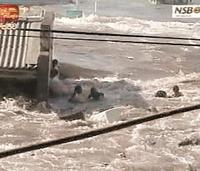 I can't really add much to the Tsunami coverage, as it is already all over all the media. It is tragical and devasting of course. I don't know how to deal appropriately with over 100,000 dead and many more personal tragedies. Strange that I can't personally even relate to it before I read that there are still around 500 Danish people missing. That's about a 10 times bigger chunk of Denmark than 9/11 was to the U.S. And 1500 Swedish people. But the much bigger disasters were for many faraway villages that can't even be properly accounted for, and many of which no longer exist. I can't really add much to the Tsunami coverage, as it is already all over all the media. It is tragical and devasting of course. I don't know how to deal appropriately with over 100,000 dead and many more personal tragedies. Strange that I can't personally even relate to it before I read that there are still around 500 Danish people missing. That's about a 10 times bigger chunk of Denmark than 9/11 was to the U.S. And 1500 Swedish people. But the much bigger disasters were for many faraway villages that can't even be properly accounted for, and many of which no longer exist.
Otherwise the only thing I can say is that it shouldn't have happened. Well, you can't stop the biggest earthquake in memory from happening. But it took several hours for the tsunami to hit the beaches it hit. It is an example of terrible communication systems that most people had no clue. The U.S. military and the State Department knew, and secured the Diego Garcia military base. But it succeeded in alerting only two foreign governments. The top meteorologists in Thailand knew, but they decided to not tell anybody, to not disturb the tourist industry. As if an unexpected tsunami isn't a lot more disturbing. And, anyway, there wasn't much of a system in place to warn anybody in most places. The people who knew didn't quite know who to contact.
Interestingly, the animals knew, even if nobody told them in advance. There were largely no dead animals, because they can sense stuff like that coming, and instinctly get themselves to safety.
[ News | 2004-12-31 17:01 | | PermaLink ] More >
|
|
| Wednesday, November 17, 2004 |  |
|
|
|
 Until two days ago Kevin Ryan was head of the Environmental Health Laboratory Div. of Underwriter's Laboratory. That is the lab that originally had certified the steel that the World Trade Center was built with. He had recently written a memo to Frank Gayle of the National Institute of Standards and Technology questioning that the steel had failed in the WTC 1 and WTC 2 collapses due to the burning jet fuel. I'll include his memo below. He simply points out that the information doesn't match what his lab knew about the steel, and that the official reports are based on ideas that have nothing to do with the known laws of physics. I.e. the possible temperatures of burning fuel and the temperatures at which steel might possibly be softened. That has been mentioned before, of course, but experts in the right positions have stayed strangely quiet. So I guess this guy needed to be shut up too. Doesn't sound like he'll be very quiet, though. Until two days ago Kevin Ryan was head of the Environmental Health Laboratory Div. of Underwriter's Laboratory. That is the lab that originally had certified the steel that the World Trade Center was built with. He had recently written a memo to Frank Gayle of the National Institute of Standards and Technology questioning that the steel had failed in the WTC 1 and WTC 2 collapses due to the burning jet fuel. I'll include his memo below. He simply points out that the information doesn't match what his lab knew about the steel, and that the official reports are based on ideas that have nothing to do with the known laws of physics. I.e. the possible temperatures of burning fuel and the temperatures at which steel might possibly be softened. That has been mentioned before, of course, but experts in the right positions have stayed strangely quiet. So I guess this guy needed to be shut up too. Doesn't sound like he'll be very quiet, though.
Various comments and info here and an article here
[ News | 2004-11-17 23:30 | | PermaLink ] More >
|
|
| Thursday, October 7, 2004 |  |
|
|
|
 George Soros now has a blog. He's done many good things like the Open Society Institute. And, now, it is quite useful when a billionaire can put some significant resources behind opposing George Bush's regime. George Soros now has a blog. He's done many good things like the Open Society Institute. And, now, it is quite useful when a billionaire can put some significant resources behind opposing George Bush's regime.
Yesterday Soros got a good deal more traffic than he had expected. During the U.S. vice presidential debate, Dick Cheney suggested for the viewers to go to factcheck.com to get the truth about accusations made about his former company Haliburton. And after the debate, an average of a hundred people a second went to that site. It is just that Cheney unfortunately had given the wrong URL. He had meant to say factcheck.org. Factcheck.com happened to be some random commercial site hosted by some people in the Cayman Islands. When they realized what had happened, they decided it would be a better idea if they redirected all that traffic to Soros' site, even though he has no relation to them. A good political statement, and Soros' server could probably handle the traffic load. Which factcheck.org is having a bit of trouble with. Seems like a fine and objective site, though. I think Cheney regrets that he tried to mention it, as they found quite a few more flaws in what he said than in what Edwards said.Cheney wrongly implied that FactCheck had defended his tenure as CEO of Halliburton Co., and the vice president even got our name wrong. He overstated matters when he said Edwards voted "for the war" and "to commit the troops, to send them to war." He exaggerated the number of times Kerry has voted to raise taxes, and puffed up the number of small business owners who would see a tax increase under Kerry's proposals.
Edwards falsely claimed the administration "lobbied the Congress" to cut the combat pay of troops in Iraq, something the White House never supported, and he used misleading numbers about jobs. Hard work to keep those guys honest, I'm sure. While watching their debate, I thought they came out about even, but now reading the fact check analysis, it is obvious that they didn't do equally well in the truth department.
[ News | 2004-10-07 15:54 | | PermaLink ] More >
|
|
| Thursday, June 17, 2004 |  |
|
|
|
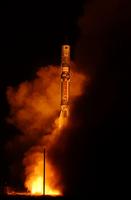 I'd really like to be able to watch Danish TV sometimes, and that just became a lot more likely. Here you see a Proton Breeze M rocket taking off from the Baikonur Cosmodrome in Kazakhstan this morning, carrying Intelsat 10-02. That is a huge communications satellite, incidentally built here in Toulouse, which, amongst other things, will provide video conferencing, internet access, telephone, and many TV channels. Including the Danish ones. The major new thing in addition to the added bandwidth will be its coverage area, which means the signal will be available with a normal small parabola, even in southern Europe. I'd really like to be able to watch Danish TV sometimes, and that just became a lot more likely. Here you see a Proton Breeze M rocket taking off from the Baikonur Cosmodrome in Kazakhstan this morning, carrying Intelsat 10-02. That is a huge communications satellite, incidentally built here in Toulouse, which, amongst other things, will provide video conferencing, internet access, telephone, and many TV channels. Including the Danish ones. The major new thing in addition to the added bandwidth will be its coverage area, which means the signal will be available with a normal small parabola, even in southern Europe.
[ News | 2004-06-17 16:07 | | PermaLink ] More >
|
|
| Thursday, June 10, 2004 |  |
|
|
|
 WorldChanging mentions new blog site Meta Efficient. An ongoing index of all things efficient. I.e.: WorldChanging mentions new blog site Meta Efficient. An ongoing index of all things efficient. I.e.: # Energy & Resource Efficient
# Affordable
# Reliable
# Non-polluting
# Portable (where possible) Best-of-breed gadgets for the environmentally conscious.
[ News | 2004-06-10 11:30 | | PermaLink ] More >
|
|
| Saturday, May 1, 2004 |  |
|
|
|
 Ten new countries joined the European Union today. Ten new countries joined the European Union today.Poland
Czech Republic
Slovakia
Slovenia
Hungary
Estonia
Latvia
Lithuania
Malta
Cyprus 75 million more people. 455 million now.
The new people seemed to be very happy with it, with big celebrations and fireworks in all the new countries. People in the old countries probably didn't think of feeling the same about it. But watching the celebrations on TV was sort of contageous. I think it is a good thing.
[ News | 2004-05-01 17:55 | | PermaLink ] More >
|
|
| Sunday, March 28, 2004 |  |
|
|
|
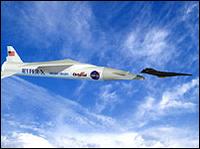 So, NASA was successful with their X-43A supersonic test flight, reaching Mach 7. Which is good news for the scramjet technology, and opens the door to cheaper, less resource-intensive space vehicles. So, NASA was successful with their X-43A supersonic test flight, reaching Mach 7. Which is good news for the scramjet technology, and opens the door to cheaper, less resource-intensive space vehicles.
But, hey, what about the Aurora black project? A strange triangular craft has apparently been making regular trips from Nevada to Scotland and back for a number of years. At Mach 6. Which ought to indicate that it was beyond the experimental stage. And it was funded with a number of billions of dollars, hidden away in the budgets. What's up with that? Who's that reserved for?
[ News | 2004-03-28 15:34 | | PermaLink ] More >
|
|
| Thursday, March 25, 2004 |  |
|
|
|
 This Saturday there's the first WTF event in London. "WTF" standing for "WTF's The Future?!" A social forum and open space for various grassroots projects, people and organizations. Wish I could be there, but the necessary energies aren't really there for me to travel every week. But I'll be there virtually, as they have IRC channels open and maybe even streaming video. This Saturday there's the first WTF event in London. "WTF" standing for "WTF's The Future?!" A social forum and open space for various grassroots projects, people and organizations. Wish I could be there, but the necessary energies aren't really there for me to travel every week. But I'll be there virtually, as they have IRC channels open and maybe even streaming video.
[ News | 2004-03-25 14:27 | 0 comments | PermaLink ]
|
|
| Tuesday, March 23, 2004 |  |
|
|
|

Via Creative Generalist, check out Freecycle. Don't just throw unneeded stuff away and buy new. Put it up to be picked up for free by people in your local area. And you can be at the receiving end too, of course.One rule: everything posted must be free. Whether it's a chair, a fax machine, piano, or an old door to be given away, it can be posted on the network. Or, maybe you're looking to acquire something yourself? Respond to the posting directly and you just might get it. After that it is up to the giver to set up a pickup time for passing on the treasure. Seems to happen successfully in several hundred cities. And simply through e-mails in yahoo groups.
[ News | 2004-03-23 16:53 | | PermaLink ] More >
|
|
| Friday, March 12, 2004 |  |
|
|
|
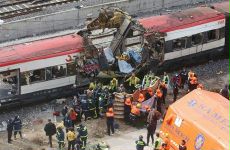 Around 200 people dead from simultaneous terror bombings of commuter trains in Madrid. Around 200 people dead from simultaneous terror bombings of commuter trains in Madrid.
Well, I normally am not of a mind to just mention bad news because it is "news". But I can mention a few things it brings up for me...
It is the next country over, so it doesn't have the same emotional impact for me personally as it would if it were in France, even in Paris. Or in Denmark or in Los Angeles, places that have been home for me. Somehow we will often compartmentalize things, so it somehow doesn't hit the same unless we consider it within "our" territory. Otherwise it feels like "over there", rather than "here".
It is always a tragedy when innocent people die violently and suddenly. But we have weird subjective ways of measuring it. It is the same kind of tragedy for the family and friends for every single person. But if 200 people died in a plane crash, it wouldn't register remotely the same way. Or if 50,000 people die in an earthquake in China, it is a bit unfathomable to try to relate to it, so it easily becomes just another news item. Or if 500,000 people die in Iraq from the side effects of a war carried out to protect oil interests, how do I respond to that? It is bad, but it easily just becomes an abstract number, rather than that number of personal tragedies.
But we're nevertheless surprisingly connected. So if even an apparently small number of people is involved in some dramatic event, we usually know somebody who knows somebody. In my French class this morning, several of the Spanish people present had friends or family members who were there in Madrid and who had been on the next train or the previous train and that kind of thing.
This particular event seems to have a large emotional impact on Spain and on the rest of Europe. A mini 9-11 event. Something that shouldn't be possible. Something we didn't expect where we live. Something that makes us feel more vulnerable. And maybe angry at the perpetrators, even the first possible group identified as the likely perpetrators, whether they actually did it or not. Or maybe more compassionate and solidaric with each other.
My guess would be that this is more related to an apparent al-Qaeda related group, rather than the Basque separatist group ETA.
But I also believe that when deliberate well organized, well planned, and well financed events are carried out, one needs to look carefully at who it benefits. "Follow the money" is one variation of that. Or look at who actually wants the outcome that quite naturally follows from such an event. Which often gives totally different answers than those that follow from who's officially blamed. Did it further the cause of Bin Laden and al-Qaeda and the Taliban that 9-11 happened? No, they were just about bombed into oblivion. And the United States was turned into an oppressive police state with a strengthened military and the willingness to use it anywhere, with little justification, without any need for public support. The Iraq invasion, however, was a godsend for groups like al-Qaeda, who were supplied with another lawless territory to operate out of, and a lot of motivated new recruits, and a lot of easy targets. So, if you follow my logic here, 9-11 was most likely masterminded by folks who wanted to turn the United States into a much more tightly controlled society, and who wanted greatly increased power and resources given to military activities, with greatly lessened checks and balances. You can guess who that might be, but that it would be some guy in a tent in Afghanistan would be a bit farfetched. And the unilateral Iraq invasion was masterminded by folks who wanted to support increased terrorism and lawlessness in the world. And, sure, those might very well be the exact same people, as those objectives can dovetail into each other quite well. But those actions certainly wouldn't be carried out neither by people who want to free muslim areas from outside influences, nor people who want peace and safety and freedom for the common folks anywhere. Unless the planners were extremely mis-informed, uneducated, unprepared and bad at carrying out any objective at all in any organized way. Which I'm quite sure isn't the case.
So, as to Madrid, who's cause would this support? Certainly not the ETA, as everybody hates them now, and large resources now will be applied to wiping them out. No, it would support folks who would like Europe to catch up to the U.S. in terms of population control and general paranoia.
What to do? What regular people can do is at least to use the coming elections to remove the government leaders in their countries who are furthering that agenda by their actions and propaganda. So, say goodbye to Jose Maria Aznar and George W. Bush.
[ News | 2004-03-12 10:14 | | PermaLink ] More >
|
|
| Tuesday, June 24, 2003 |  |
|
|
|
Reboot is another conference I more easily can go to when living in Europe. Every year in my hometown of Copenhagen. Attracts some of the big names in techie bloggers. BoingBoing lists notes and speeches from several of them at last week's event: Marc Canter, Tim O'Reilly, Dan Gillmor, and more.
[ News | 2003-06-24 02:53 | | PermaLink ] More >
|
|
| Monday, June 2, 2003 |  |
|
|
|
And here is some good news from Salam:"Ya Allah have mercy on our souls. The old state owned Internet center in Adil district has been taken over by anarchists and they are offering internet access for FREE. You just need to dial up a number, no password, no special settings. Whoever heard of anyone doing that?
About week ago a rumor spread that the Adil center has put up a sat dish and will be using the setup the Iraqi government used to have to provide the service. [Uruklink.net] is back. The people who used to work there opened the center 4 days ago; you can have an hour of internet for as little as 2000dinars. Take that you greedy sharks. The center is very well equipped, they put together 30 of their best computers and have a very good connection (ok so 30 computers in a city of 5 million is nothing, but it is a start). They even got military protection. The people who work there got a couple of soldiers from the nearest army checkpoint to take a look, the officer asked if it was OK for his men to check on their emails and stuff. The reaction the first couple of guys who came in was a very amazed “Wow!”.
Yesterday they put up a piece of paper that said: “we are happy to announce that you can get free internet access by dialing up this number”. A small little paper on the notice board. The telephone network is not fully operational, certain districts don’t have phones at all, but as I wrote earlier many of the exchanges that have not been destroyed or looted have been linked together. You will need to keep dialing for an hour to get thru but it works, I tried it.
Not a million bad things could have wiped the grin off my face when I read that little note."
[ News | 2003-06-02 17:09 | | PermaLink ] More >
|
|
<< Newer stories Page: 1 2 3 4 Older stories >> |

